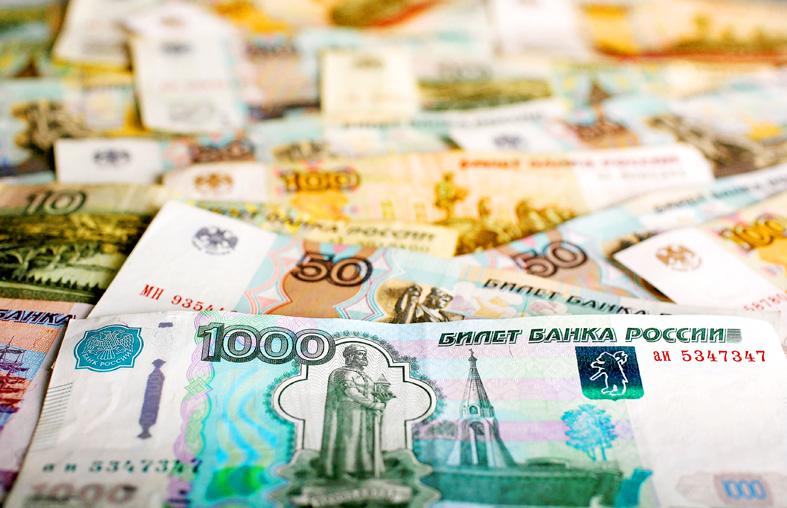Leaders from some EU member states on Thursday said that Russia’s demand that “unfriendly” countries use rubles to buy for its oil and gas could breach supply contracts.
Russian President Vladimir Putin’s demand on Wednesday for ruble payments sent European gas prices surging and added to concerns over supply disruptions in the EU, which gets about 40 percent of its gas from Russia.
Germany and Italy said the move might breach energy supply contracts.

Photo: Reuters
German Chancellor Olaf Scholz said the currency German companies must pay for Russian fossil fuels was fixed in their contracts.
“There are fixed contracts everywhere, with the currency in which the deliveries are to be paid being part of these contracts... In most cases it says euros or dollars,” Scholz said on his arrival for an EU summit in Brussels on Thursday.
That was echoed by Italian Prime Minister Mario Draghi.
“This is basically a breach of contract, this is important to understand,” he said.
European Commission President Ursula von der Leyen agreed, saying the move was an attempt to circumvent EU sanctions against Russia.
“We will not allow our sanctions to be circumvented. The time when energy could be used to blackmail us is over,” she said.
Payments in rubles would shore up the Russian currency, which has plummeted since the Feb. 24 invasion.
Analysts said ruble payments would be possible without breaking EU sanctions, which do not directly hit oil and gas supplies, but target banks that could be involved in ruble transactions.
Russia’s main gas exporter, Gazprom, has more than 40 long-term gas agreements with European counterparties, with Europe paying hundreds of millions of dollars per day to Moscow for fossil fuels.
Gazprom said that about 97 percent of its gas sales to Europe and other countries as of Jan. 27 were settled in euros or US dollars.
A disruption to Russian oil and gas imports would hit some EU countries harder than others. Germany, Europe’s biggest economy and energy consumer, receives 18 percent of Russia’s gas exports and 11 percent of its oil.
Lithuanian President Gitanas Nauseda said he was “not scared” by Putin’s demand, as Lithuania does not import Russian crude oil and could replace Russian gas with liquefied natural gas from elsewhere.
“Nobody will pay in rubles,” Slovenian Prime Minister Janez Jansa said.
Separately, the German Ministry for Economic Affairs and Climate Action wants to halve the country’s dependence on Russian oil by the summer and have no Russian hard coal imports by the autumn, Der Spiegel magazine said yesterday, citing a ministry memo.
“By the middle of the year, Russian oil imports to Germany are expected to be halved,” Der Spiegel quoted the memo as reading. “By the end of the year, we aim to be almost independent.
“By autumn, Germany can be independent of Russian coal,” it said.
Der Spiegel also quoted ministry sources as saying: “Despite the progress, an immediate embargo would still have too serious economic and social consequences.”

WEAKER ACTIVITY: The sharpest deterioration was seen in the electronics and optical components sector, with the production index falling 13.2 points to 44.5 Taiwan’s manufacturing sector last month contracted for a second consecutive month, with the purchasing managers’ index (PMI) slipping to 48, reflecting ongoing caution over trade uncertainties, the Chung-Hua Institution for Economic Research (CIER, 中華經濟研究院) said yesterday. The decline reflects growing caution among companies amid uncertainty surrounding US tariffs, semiconductor duties and automotive import levies, and it is also likely linked to fading front-loading activity, CIER president Lien Hsien-ming (連賢明) said. “Some clients have started shifting orders to Southeast Asian countries where tariff regimes are already clear,” Lien told a news conference. Firms across the supply chain are also lowering stock levels to mitigate

IN THE AIR: While most companies said they were committed to North American operations, some added that production and costs would depend on the outcome of a US trade probe Leading local contract electronics makers Wistron Corp (緯創), Quanta Computer Inc (廣達), Inventec Corp (英業達) and Compal Electronics Inc (仁寶) are to maintain their North American expansion plans, despite Washington’s 20 percent tariff on Taiwanese goods. Wistron said it has long maintained a presence in the US, while distributing production across Taiwan, North America, Southeast Asia and Europe. The company is in talks with customers to align capacity with their site preferences, a company official told the Taipei Times by telephone on Friday. The company is still in talks with clients over who would bear the tariff costs, with the outcome pending further

Six Taiwanese companies, including contract chipmaker Taiwan Semiconductor Manufacturing Co (TSMC, 台積電), made the 2025 Fortune Global 500 list of the world’s largest firms by revenue. In a report published by New York-based Fortune magazine on Tuesday, Hon Hai Precision Industry Co (鴻海精密), also known as Foxconn Technology Group (富士康科技集團), ranked highest among Taiwanese firms, placing 28th with revenue of US$213.69 billion. Up 60 spots from last year, TSMC rose to No. 126 with US$90.16 billion in revenue, followed by Quanta Computer Inc (廣達) at 348th, Pegatron Corp (和碩) at 461st, CPC Corp, Taiwan (台灣中油) at 494th and Wistron Corp (緯創) at

NEGOTIATIONS: Semiconductors play an outsized role in Taiwan’s industrial and economic development and are a major driver of the Taiwan-US trade imbalance With US President Donald Trump threatening to impose tariffs on semiconductors, Taiwan is expected to face a significant challenge, as information and communications technology (ICT) products account for more than 70 percent of its exports to the US, Chung-Hua Institution for Economic Research (CIER, 中華經濟研究院) president Lien Hsien-ming (連賢明) said on Friday. Compared with other countries, semiconductors play a disproportionately large role in Taiwan’s industrial and economic development, Lien said. As the sixth-largest contributor to the US trade deficit, Taiwan recorded a US$73.9 billion trade surplus with the US last year — up from US$47.8 billion in 2023 — driven by strong